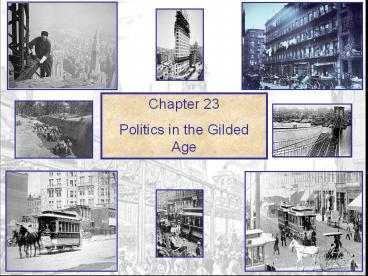Politics in the Gilded Age - PowerPoint PPT Presentation
1 / 19
Title: Politics in the Gilded Age
1
Chapter 23 Politics in the Gilded Age
2
Grant Presidency 1869-1877
- Scandal ridden
- Black Friday- Gould Fisk scheme on the gold
market done w/bribes - Credit Mobilier- Railroad stock bribes to
Congress - Whiskey Ring- millions in excise taxes stolen
- Sec. of War Belnap- resigns for taking bribes
3
Gilded Age Politics
- A. Political See-Saw
- 1. Close elections, frequent turnovers in House
makeup - a) majority party switched six times in 11
session between 1869-1891 - b) divided government (H, S, and White House)
- c) discourages bold stands by politicians
4
Gilded Age Politics
- B. Political Parties
- a) little difference between the Dems and the
Reps on major issues tariffs, currency, civil
service reform - b) ferocious competition
- c) motivate their constituents at election time
(voter turnout 80 from 1860s-90s)
5
Gilded Age Politics
- C. Characteristics of the Parties
- 1. cultural ideological differences
- a. Republicans Puritan religious roots, native
born, support gov't involvement in economy and
society - b. Democrats numbers include Roman Catholics
and Lutherans, less stern, opposed gov't attempts
to impose a single moral standard on society.
6
Gilded Age Politics
- 2. geographical centers of party loyalty
- a. Democrats South (but not among freedmen),
Northern industrial cities (immigrants and
political machines) - b. Republicans Midwest, Northeast, and freedmen
7
Gilded Age Politics
- 3. use of patronage and spoils system
- a. use of spoils to gain support common
- b. Sen. Roscoe Conkling (R-NY) and the
"Stalwarts" v. Rep. James G. Blaine (R-ME) and
the Half-Breeds stalemate the GOP over the issue
of civil service reform
8
The Emergence of Political Machines
- The Political Machine
- Political machine organized group that controls
city political party - The Machine gives services to voters and
businesses for political, financial support - Provided much needed welfare services to the
cities (sanitation, water, libraries, parks) - After Civil War, political machines gain control
of major cities - Control of? money, elections, projects
9
Political Machine Organization
The Goal? Use money and influence to control the
citys politics and economics
10
The Emergence of Political Machines
- The Role of Political Bosses
- Whether or not city boss serves as mayor, he
- Controls access to city jobs, business licenses
- Influences courts, municipal agencies
- Arranges building projects, community services
- Bosses paid by businesses, get voters loyalty,
extend influence - Immigrants and the Machine
- Many captains, bosses 1st or 2nd generation
Americans - Machines help immigrants with naturalization
(getting citizenship), jobs, housing
11
Municipal Graft and Scandal
- Election Fraud and Graft
- Machines use electoral fraud (cheating) to win
elections - Graft illegal use of political influence for
personal gain - Machines take kickbacks (), bribes to allow
legal illegal activities
12
Municipal Graft and Scandal
- The Tweed Ring Scandal
- 1868 William M. Tweed (Boss Tweed) heads Tammany
Hall in NYC - Leads Tweed Ring, defrauds (steals) city of
millions of dollars - Cartoonist Thomas Nast helps arouse public
outrage against Tweed - Tweed Ring broken in 1871
13
POLITICAL MACHINES AND CORRUPT CITY BOSSES
CONTROLLED CITIES
TAMMANY HALL, NYC
14
CARTOON ABOVE COMPARES TWEEDS EXCESSIVE THEFT TO
THAT OF A MINOR BREAD THIEF
15
(No Transcript)
16
Civil Service Replaces Patronage
- Patronage Spurs Reform
- Patronage govt jobs to those who can help
candidates get elected - Civil service (govt admin.) are all patronage
jobs - Some appointees not qualified some use position
for personal gain - Reformers want merit system for hiring civil
service - Merit? The most qualified, not the best connected
should get the important jobs
17
Civil Service Replaces Patronage
- Reform Under Hayes, Garfield, and Arthur
- Republican Rutherford B. Hayes elected president
(1876) - Names independents to cabinet
- Creates commission to investigate corruption
- Fires 2 officials angers Stalwarts (group that
supported corrupt ways, led by NY boss Conkling) - 1880, Republican independent James A. Garfield
wins election
18
Civil Service Replaces Patronage
- Reform Under Hayes, Garfield, and Arthur
- Stalwart Chester A. Arthur is vice-president
- Garfield gives patronage jobs to reformers is
shot and killed - Half-Breeds?-Repubs. who favored civil service
reform and opposed patronage - As president, Arthur urges Congress to pass civil
service law - Pendleton Civil Service Reform Act of 1883
appointments (govt jobs) based on exam score (on
your merit), ends the spoils system
19
- d. Assessing the Gilded Age presidents
- 1. "The Forgettable Presidents"
- a) Grant, Hayes, Garfield, Arthur, and Harrison
- b) left either blanks or blots on the political
record - 2. Why such little vitality in politics?
- a) the industrial economy lures away talented men
- b) loss in political leadership was inversely
related to the surge in economic growth































